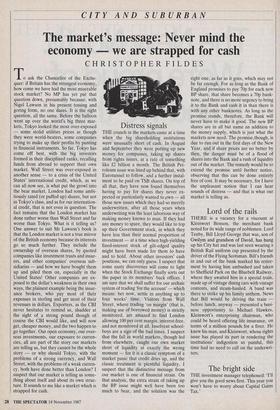CITY AND SUBURBAN
The market's message: Never mind the economy — we are strapped for cash
CHRIS TOPHER FI LDES
To ask the Chancellor of the Exche- quer: if Britain has the strongest economy, how come we have had the most miserable stock market? No MP has yet put that question down, presumably because, with Nigel Lawson in his present tossing and goring form, no one dares. It is the right question, all the same. Before the balloon went up over the world's big three mar- kets, Tokyo looked the most over-exposed — some stolid utilities prices as though they were world-beaters, some companies trying to make up their profits by punting in financial instruments. So far, Tokyo has come off best, with the big investors formed in their disciplined ranks, recalling funds from abroad to support their own market. Wall Street was over-exposed in another sense — to a crisis of the United States' international credit, which, as we can all now see, is what put the growl into the bear market. London had some ambi- tiously rated (or puffed up) shares, but not in Tokyo's class, and as for our internation- al credit, that is not even in question. The fact remains that the London market has done rather worse than Wall Street and far worse than Tokyo. What is it telling us? One answer to suit Mr Lawson's book is that the London market is not a true mirror of the British economy because its interests go so much further. They include the ownership of overseas shares, by quoted companies like investment trusts and insur- ers, and other companies' overseas sub- sidiaries — and how we have bought them up and piled them on, especially in the United States! Other companies are ex- posed to the dollar's weakness in their own ways, the plainest example being the insur- ance brokers, who pay most of their expenses in sterling and get most of their revenues in dollars. Exporters, as the CBI never hesitates to remind us, shudder at the sight of a strong pound though of course the CBI would like, and will now get, cheaper money, and the two happen to go together. Our open economy, our over- seas investments, our exposure to curren- cies, all are part of the story our markets are telling us, but they cannot be the whole story — or why should Tokyo, with the problems of a strong currency, and Wall Street, with the problems of a weak curren- cy, both have done better than London? I suspect that our market is telling us some- thing about itself and about its own struc- ture. It sounds to me like a market which is strapped for cash.










































































 Previous page
Previous page